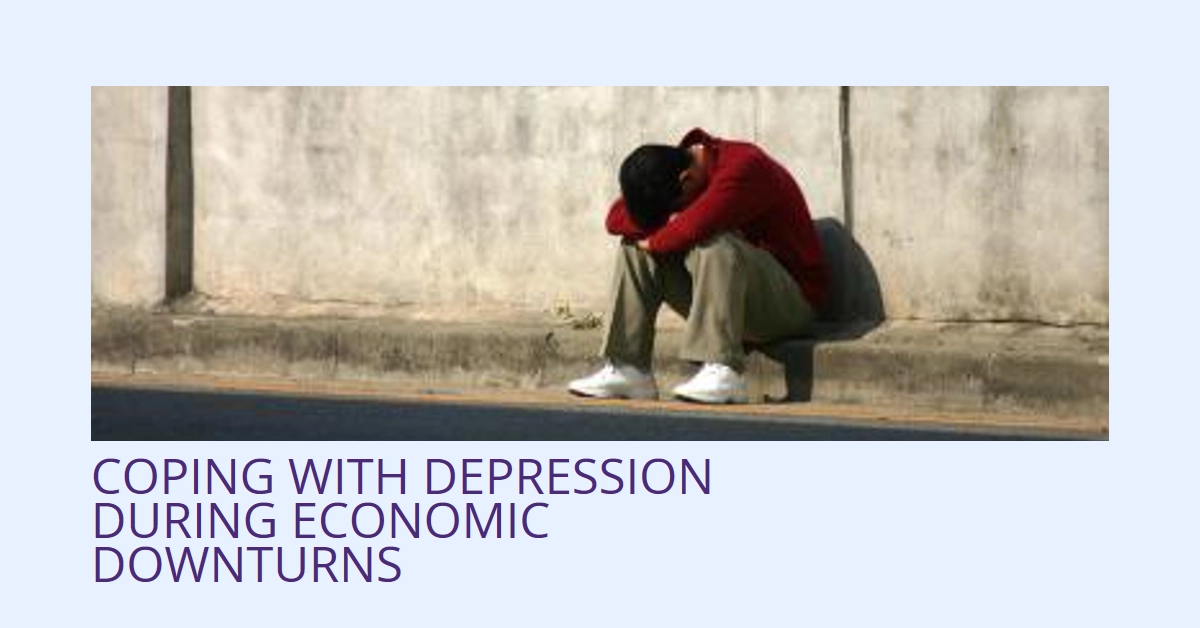Introduction
In recent times, the world has experienced significant economic downturns that have impacted not just financial markets and employment rates, but also the mental health of individuals across the globe. A particularly alarming consequence of these economic challenges is the rise in cases of depression. Understanding the intricate connection between economic stress and depression is crucial for effective healing and coping strategies.
The Impact of Economic Downturns on Mental Health
A. Economic Stress and Its Psychological Effects
Economic downturns create an environment of uncertainty and stress. The fear of job loss, the reality of unemployment, and financial insecurities contribute to a heightened state of anxiety, which can be a precursor to depression. The pressure to meet basic needs like housing, food, and healthcare can be overwhelming, leading to feelings of helplessness and hopelessness – two core symptoms of depression.
B. The Statistics: A Closer Look
Recent studies have shown a direct correlation between economic recessions and an increase in mental health issues, particularly depression. During these periods, mental health services often report a spike in the number of people seeking help for depression-related symptoms.
Understanding Depression in the Context of Economic Hardship
A. Symptoms and Diagnosis
Depression is more than just feeling sad or going through a rough patch; it’s a serious mental health condition that affects one’s emotions, thoughts, and behaviours. Symptoms can include persistent sadness, loss of interest in activities, changes in appetite or weight, sleep disturbances, fatigue, feelings of worthlessness or excessive guilt, difficulty concentrating, and thoughts of death or suicide.
B. The Unique Challenges of Depression during Economic Hardship
For individuals facing economic difficulties, the symptoms of depression can be compounded by their financial situation. The stress of financial insecurity can intensify feelings of worthlessness and hopelessness. Additionally, there can be a stigma associated with seeking help for mental health issues, particularly in times of economic strain, when resources are limited, and priorities are centered on immediate survival needs.
Strategies for Coping and Healing
A. Professional Help and Therapy Options
Seeking professional help is a critical step in coping with depression during economic downturns. Therapies like Cognitive Behavioural Therapy (CBT) and Interpersonal Therapy (IPT) have been effective in treating depression. Clinics like InnerSight Psychotherapy offer specialized therapy sessions tailored to individual needs, providing a supportive environment to navigate through these challenging times.
B. Lifestyle Adjustments and Self-Care
Alongside professional help, making lifestyle adjustments can significantly aid in managing depression. This includes maintaining a routine, exercising regularly, eating a balanced diet, getting enough sleep, and practising mindfulness and relaxation techniques. Engaging in community activities or support groups can also provide a sense of belonging and support.
C. Financial Management and Planning
Addressing the root cause of stress during economic downturns is crucial. Financial counselling, budgeting, and planning can provide a sense of control and reduce anxiety related to financial uncertainty. Many communities offer resources for financial planning and assistance that can be invaluable during these times.
D. Building a Support Network
Having a strong support network is vital. This can include family, friends, mental health professionals, and support groups. Sharing experiences and seeking advice can alleviate feelings of isolation and provide practical solutions to manage economic and emotional challenges.
Conclusion: A Path Forward
Economic downturns can be challenging, but it’s important to remember that depression is treatable, and help is available. By understanding the connection between economic stress and depression and adopting coping strategies, individuals can navigate these difficult times more effectively. InnerSight Psychotherapy is committed to providing support and guidance in this journey towards healing. Remember, reaching out for help is a sign of strength, not weakness. If you or someone you know is struggling, don’t hesitate to contact us for assistance or to book a therapy session.
FAQs: Depression in Economic Downturns
Can economic downturns cause depression in people who have never had it before?
Economic downturns can indeed trigger depression in individuals who have never experienced it before. The stress and uncertainty associated with financial instability can be significant triggers for mental health issues, including depression.
How can I help a family member who is experiencing depression due to financial stress?
Supporting a family member dealing with depression involves being empathetic, offering emotional support, encouraging them to seek professional help, and possibly assisting with finding financial management resources or support groups.
Are there specific signs of depression that are more prevalent during economic downturns?
While the core symptoms of depression remain consistent, economic downturns may amplify feelings of hopelessness, anxiety over financial matters, and stress-related physical symptoms like fatigue and sleep disturbances.
What are some cost-effective ways to seek treatment for depression during financial hardship?
There are several cost-effective treatment options, including community mental health centers, sliding-scale fees at certain therapy clinics, online therapy platforms, and support groups which often have lower costs or are free.
How long does depression caused by economic stress typically last?
The duration of depression varies greatly among individuals and depends on various factors like the severity of the economic stress, personal resilience, the presence of a support system, and whether professional help is sought.






